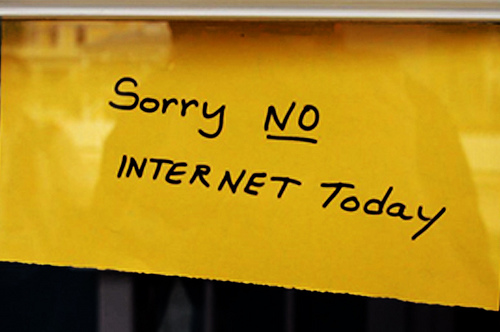
The Digital Nomad’s Guide to Surviving an Internet Outage
February 2, 2011 | Technology, Work & Business
I can’t count the number of times I’ve had people say to me, “Wow, so you can work anywhere? That’s great.” And I say, “Yep, as long as there’s Internet access.” And that’s usually the end of the conversation. We never get into the logistics of actually finding (and keeping) reliable Internet access; I don’t mention how often I find myself without Internet access, struggling to make important phone calls or meet deadlines—either because of an outage, or because I’m in a place where there simply isn’t any service available.
There have been quite a few power outages in Buenos Aires (or at least my neighborhood) recently, a good reminder of the importance of having systems in place to soften the blow. Every situation is unique and I still come across flaws in my set-up now and then, but I’ve figured out some good methods over the years, so I thought I’d share them here.
First, there are some steps you should take in advance so no matter what happens, you’ll be much better equipped to keep everything going smoothly. All of the scenarios described below have actually happened to me—digital nomads need to be prepared for anything!
(Many of the challenges of being without Internet access for your computer can be mitigated somewhat by having a smartphone with Internet access, but even that could fail if you find yourself somewhere you can’t get service or it is prohibitively expensive. And while a smartphone can work great to send a quick email, it’s not a viable option for most of us to actually get any work done.)
On Location
- Try not to schedule any deadlines or meetings for the first few days after you arrive in a new place. You never know what the situation will be once you arrive (a hostel might have Wi-Fi, but the signal doesn’t reach your room, or a furnished apartment might not have an Internet connection in place when you arrive), so it’s best to have some time to sort everything out without having to stress about being online at a particular time.
- Wherever you are, scope out a variety of possible backup options in case your usual source of Internet/power/phone goes out. A nearby cybercafé or café with Wi-Fi is handy, but it’s a good idea to have another backup farther away. If there’s an outage that affects a small, localized area, your nearby backup might not have Internet/power either! Especially if you have important phone calls to make, it’s a good idea to have an international phone card (bought locally), so you’ll just need access to a phone to make a call—it won’t be as cheap as Skype, but at least you can get through!
- If at all possible, don’t stay somewhere (or sign up for service yourself) where your telephone landline and Internet are on the same system. If the power or Internet goes out, you won’t have a phone, either, which just further complicates matters. In many countries, calls from a cell phone are much more expensive than landline calls, so be prepared if you intend to rely only on your cell phone.
On/Off Your Computer
- Keep offline copies of contact information and other files/materials you might need access to for a meeting or deadline. If you use Gmail, consider using Offline Gmail to be able to access your email even when you’re offline. Note, however, that it doesn’t work as well if you use more than one Gmail account. When you’re offline you will only be able to access whichever account you were most recently logged in to, and if you have Multiple Sign-In enabled, you can’t even set up Offline Gmail. Another option would be to use POP/IMAP to forward/download your Gmail to a desktop mail program like Thunderbird, Outlook, or Apple Mail, so your email is stored on your computer as well as in the cloud.
- Ideally, keep a paper copy of contact information for current clients and other important contacts, in case you can’t get on your computer to look it up.
- Whereas it’s a good idea to have your email/files offline if you can’t get online, it is also extremely useful to have online backup of your files. That way you can access them from any computer, wherever you can find Internet, and it’s also helpful if you work on multiple computers, or in case your hard drive crashes. I currently use Dropbox (sign up via that link and we both get extra storage space!), but I’ve also heard good things about other systems such as SugarSync and Carbonite. The free options offered by Dropbox and SugarSync don’t give you enough storage space to backup your whole computer, so I just use it for my most important files and current project files. My Dropbox was a huge help recently when the power went out and my computer’s battery wasn’t charged. Without having to schlep my computer to a power source, I was able to get on another computer that did have Internet and download the files I needed.
- Set up some type of email-to-SMS notification system such as AwayFind so you’ll know whether any important messages have arrived that require your attention. UPDATE: AwayFind shut down in 2015. I was a longtime user/supporter and was sad to see this one didn’t make it. I think you could achieve something similar through a service like IFTTT or Zapier [affiliate link], so that it sends an SMS or other kind of notification when you receive an email from a certain person or with a certain subject.
- I highly recommend using an online password management tool; it’s a great way for digital nomads to keep track of all their important log-in information. I use and love LastPass [that’s my affiliate link]. This is relevant to the topic at hand because if you need to log in to a sensitive account from a cybercafé, for example, your best bet is to use a one-time password to access your LastPass vault and then access your bank account or whatever site via the vault. I learned the hard way that you have to create those one-time passwords in advance, however, when you’re on a secure connection. So set up your LastPass one-time passwords now, while you have Internet access on your own computer, in case you ever need them in the future (check out the video on this page that shows you how to do it).
Damage Control
- If you can foresee a problem, and it won’t damage your reputation/relationship with someone, warn them that the Internet has been shoddy recently (or whatever the problem is), and reassure them that you are on the case and will be in touch or have everything finished as soon as humanly possible. Sometimes it’s better to warn them of a worst-case scenario and have it not pan out, than to assume all will be fine and end up missing a deadline (or your Mom’s birthday).
- For a phone/online meeting, set it up so that you will be the one to initiate the call/chat. That way you have control over how you make contact (via phone card, for example, instead of via Skype, if you can’t get online). Again, be sure you have their contact information on paper in case you can’t get to your email address book or contact list on your computer.
- Try to keep at least a minimal amount of battery time charged on your computer, so if the power goes out you’ll have time to grab whatever you need and put it on a USB flash drive.
Offline
When you’re actually experiencing an outage, all of the things you put into place earlier come into play.
- Rely on your backup locations for Internet access, or an international phone card if you need to make a call.
- Trust that your email notifications through a service such as AwayFind will keep you in the loop on any critical email messages.
- Keep clients/friends/family as informed as possible of your current situation in order to manage their expectations (for the few days leading up to Christmas I kept warning my family that the power/Internet had been off and on, and I wasn’t sure I’d be able to get online for our scheduled call, but luckily it all worked out just fine).
- Relax! You’ve done everything you can to prepare for the worst, but at some point there’s simply nothing more you can do. Take advantage of being truly unplugged and go to the beach or take yourself out for dinner.
Have you ever been without Internet when it mattered most? What systems did you have in place, or will you be sure to have in place now that you’ve been through that experience?
Get the Top 10 Logistical Things You Need to do before becoming a nomad
(That Aren't What You Think)
When you download the guide, you’ll also be subscribed to the Nomadtopia newsletter. Your email is safe with me and you can unsubscribe anytime. View our Privacy Policy.




